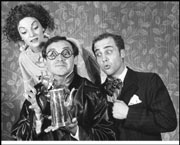TRIAL BY JURY THE SORCERER
The Seattle Gilbert & Sullivan Society Bagley Wright Theatre, Seattle Center, 341-9612, $10-$30 8 p.m. Thurs.-Sat.; 2 p.m. matinee Sat. ends Sat., July 27
The works of Gilbert & Sullivan trace an almost perfect bell curve. The 13 extant operettas (not counting their first collaboration, Thespis, for which the music is lost) ascend in quality, plateau gloriously, and drop off again at the end of the collaborators’ careers. There’s one exception to this chart, however: Their second joint effort, the 1875 one-act Trial by Jury, is a gem.
The only true “opera” in the series, if you want to get technical about it, it’s entirely sung with no spoken dialogue. Sullivan packed as many catchy tunes into its 35 minutes as he did into any of his full-length pieces. A skit about a breach-of-promise case, Gilbert’s book skewers both the legal profession and male sexual double standards, putting blithe deadpan hypocrisies into the mouths of almost every character. The Seattle Gilbert & Sullivan Society does very well by Trial in its current chipper and handsome production.
Unfortunately Trial is paired here with a much longer work that’s at the lowest point of the Gilbert & Sullivan curve. The Sorcerer, a full-length two-act, is G&S’ third collaboration and the weakest of the lot. It has always been G&S’ “problem piece” and the Society can’t quite solve it.
The plot could hardly be slenderer: Upper-crust scion Alexis, besotted with his fianc饬 Aline, rather imperiously decides that everyone should be as happily in love as he. So he hires the title character to spike the tea at his engagement fete with a love potion, causing everyone to fall in love randomly and inappropriately— ingenue with octogenarian, etc. Hilarious complications are intended to, but don’t, ensue.
“Another weakness in the scheme is that there is no dramatic action in the second act—nothing but a simple exhibition of the characters in the plight to which the elixir reduced them at the end of the first.” This quote by George Bernard Shaw applies perfectly to Gilbert’s pallid, awkward book for The Sorcerer—though the quote comes from a review of The Mountebanks, a dismayingly similar operetta Gilbert wrote 15 years later with a different composer. He was forever churning out lame variations on his fallback “lozenge plot,” in which a magic something or other (lozenge, coin, elixir) comically transforms people. (The recent film Topsy-Turvy depicted the partners’ conflict in 1884, when Gilbert first proposed The Mountebanks to an adamantly uninterested Sullivan—which happily forced Gilbert to come up with a fresh idea, i.e., The Mikado.)
The Society does what it can to pep up The Sorcerer‘s script, with subtle and affectionate tweakings (the wittiest examples are allusions to Harry Potter and Young Frankenstein). It updates the time and place, which Gilbert left unspecified, to a Gilded Age Boston mansion and changes the chorus’ role from peasants (in the original) to party guests and servants—allowing the chorus, thank goodness, to ignore the insufferable “rustic” accent Gilbert wrote for them (“Eh, but oi du loike you!”). On the other hand, there’s an old-fashioned pastoral flavor to much of the music that makes no sense when the piece is played in a wood- paneled library (Nathan Rodda designed the lavish set).
Ariadne Votava plays Aline as sharper and more assertive than the libretto suggests, a definite change for the better. Alyce Rogers brings dignity and lovableness to Aline’s mother, Lady Sangazure—the old-lady alto role that pops up in every Gilbert libretto, often as a figure of uncomfortable ridicule. And the Society knows what an asset it has in Dave Ross (the radio talk-show host), the casting standby for the comic baritone parts. This is the third time I’ve seen him—playing the title role in The Sorcerer, the title role in The Grand Duke, and Ko-Ko in The Mikado—and he’s nailed it every time. Timothy Glynn, a strong-voiced tenor, makes Alexis, frankly, a jerk; an amusing jerk, certainly, but it’s anyone’s guess what Aline sees in him. Aside from a little scraggliness in the violins, the orchestra, under Bernie Kwiram’s direction, sounds fine.
And yet, the Society still can’t make The Sorcerer work. When in 1999 it presented The Grand Duke—G&S’ final work, even more rarely performed than The Sorcerer and a disappointing anticlimax to the series—the Society just about made a case for it with a vivacious, if occasionally hyperactive, production. Hyperactivity is hardly the problem here. The show drags, and it’s not always Gilbert or Sullivan’s fault—though Sullivan’s score contains very few exciting moments and far too much down-tempo sentimental goo. With all the Society’s talent, it can’t quite pull off The Sorcerer‘s real magic act: transforming Gilbert’s cardboard characters and Sullivan’s patience-trying music into an enjoyable evening at the theater.








